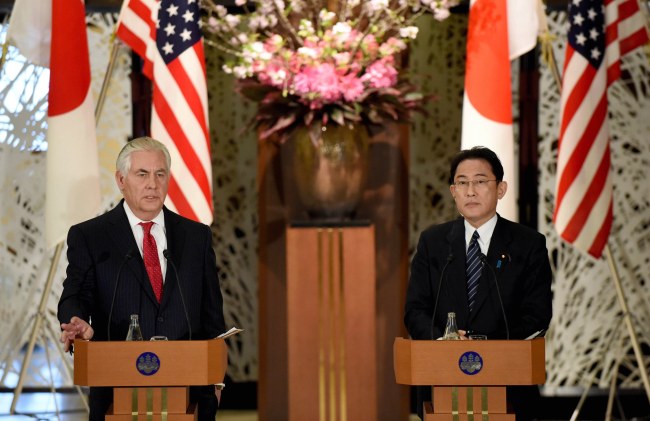The United States' top diplomat on Thursday reassured key Asian allies that Washington stands with them in the face of the accelerating missile threat from North Korea.
Secretary of State Rex Tillerson began his first Asian tour in Tokyo and held talks with Foreign Minister Fumio Kishida before a scheduled meeting with Prime Minister Shinzo Abe.
 |
US Secretary of State Rex Tillerson (L) with Japanese Foreign Minister Fumio Kishida (R) at the joint press conference after their talks at the Iikura Guesthouse in Tokyo, Japan, 16 March 2017. (Yonhap) |
President Donald Trump had caused consternation during his White House campaign by suggesting US allies Japan and South Korea need to do more to defend themselves, but since taking office has been careful to offer complete support.
Tillerson, the former oilman Trump chosen to head his diplomatic team, reiterated that message.
"The US Japan alliance remains the cornerstone of peace and stability in the Asia-Pacific region," Tillerson told his Japanese counterpart Fumio Kishida at the start of their meeting.
But he also stressed the importance of three-way cooperation with South Korea, calling it "critical in particular as we address North Korea's nuclear and ballistic missiles programmes".
Kishida, meanwhile, thanked Tillerson for US backing.
"I highly value the fact that you chose Japan as your first place to visit in Asia," he said, adding that it indicates the "importance" the US attaches to the relationship.
Tillerson travels to South Korea on Friday, before heading to China on Saturday.
There, he will urge his hosts to pressure Kim Jong-Un's regime to halt Pyongyang's nuclear and ballistic missile programs before committing to eventual peace talks.
The tour is Tillerson's first major foray into crisis diplomacy, after brief trips to Bonn and Mexico City, but he has not managed to leave Washington controversy behind him.
A small group of American expats protested outside the US embassy in Tokyo, demanding the former ExxonMobil chief executive respect the Paris climate change accord.
And back home, arguments raged over his decision to break with 50 years of tradition by refusing to allow the Washington diplomatic press corps to fly on his plane.
Some 20 US-based reporters flew commercially to Japan to follow the visit, but only one, a hand-picked writer from a small conservative outlet, was allowed on his jet.
Back home, Trump will unveil his budget blueprint later Thursday.
Former top diplomats have denounced the plan -- which will call for slashing State Department funding by 28 percent -- as a hammer blow to US influence.
Tillerson, while keeping a low public profile, appears ready however to cautiously support deep cuts.
State Department officials insist that the focus of the trip will be North
Korea and efforts to rebalance commerce without provoking a trade war with the Chinese giant.
Acting spokesman Mark Toner told reporters this week that efforts to convince China to pressure North Korea were the "looming challenge" in trans-Pacific relations.
"He's going to have an opportunity at every stop to talk about next steps or what we do now, with respect to North Korea," he said.
After Tokyo, Tillerson will fly on to Seoul for talks with South Korea's acting leader, and at the weekend he heads to Beijing amid reports he will seek to finalise plans for Chinese leader Xi Jinping to visit Trump in April.
In a news conference on Wednesday, Premier Li Keqiang said "there are bright prospects for China-US cooperation."
US officials have been spooked by North Korea's accelerating progress towards building an intercontinental ballistic missile that could threaten US mainland cities.
China is perhaps the last country with significant leverage over North Korea, which has ignored several rounds of UN-backed sanctions targeting its banned weapons program.
Beijing shares US concerns over Pyongyang's attempts to build an arsenal of nuclear devices, but has been much more measured in its reaction to the ballistic missile program.
Xi's government is publicly more concerned about Washington's decision to deploy the THAAD missile defence program in South Korea.
Washington insists THAAD is a defensive system deployed to protect the South and US bases, but China fears its advanced radar system undermines China's nuclear deterrent.
In recent comments, China's Foreign Minister Wang Yi implied the United States and North Korea were equally at fault and moving towards a "head-on collision". (AFP)








